Ward A.W. The Cambridge History of British Foreign Policy. 1783-1919. Volume 3
Подождите немного. Документ загружается.


THE SHAH'S
COUP
D'tiTAT
415
House
was
defended
by
National
Volunteers,
he
promised
to
dismiss
his
counsellors.
The
British and Russian Ministers asked
him
to
declare
that
he
had no
hostile
designs
against
the
Constitution;
and
the
monarch
obediently
replied
that he
had
none.
The failure
of the
coup
was hailed
with satisfaction
both
in
London and
Petrograd.
"At
the
New
Year's
reception," reported
Sir
Arthur
Nicolson,
"
I
told the
Tsar that
the
British
Government were much
gratified
by
the cordial
cooperation
during
the
crisis;
to
which
the
Tsar
rejoined,
'I
too'."
The brief
crisis intensified the
enmity
between
the
Shah and
the
reformers,
and
shortly
afterwards
a
bomb was
thrown
at
his
motor-
car.
The Constitutionalists
affirmed
that the
outrage
was
staged
by
the
reactionaries;
and,
on
June
1st,
1908,
the
Mejliss
secured
the
eviction
of
six more
reactionary
courtiers.
Next
day
the
Russian
Minister
and the
British
Charge
d'affaires visited the
Foreign
Minister,
to
warn
him of the
consequences
if
anything happened
to the
Shah.
"His life
is in
danger,"
declared
Hartwig,
the Russian
Minister,
"the
Nationalists
wish
to
depose
him. This we
cannot allow.
If
it
occurs,
Russia will intervene
with
British
approval."
The
warning
having
been
endorsed
by
the British
Charge
d'affaires,
the
Foreign
Minister
reported
the
conversation to the President
of
the
Mejliss.
Early
on the
following
morning,
the
Shah,
guarded by
Colonel
Liakhoff and the
Cossack
brigade,
fled
to
his
country palace.
Russian
sympathies,
at both
Petrograd
and
Teheran,
were
now
openly
on
the
side
of
the
Shah,
and
it
was
commonly
believed that
on
this occasion
it was the
hand of
Hartwig
which
had
pulled
the
strings.
But
Sir
Edward
Grey
declined
to
accept
the Russian
proposal
of a
joint
declaration to maintain
the
dynasty.
"Tell
Izvolsky,"
he
telegraphed
to
Sir A.
Nicolson,
"
that
I
strongly
deprecate
any
action
which
might
have the
appearance
of
intervening
in
internal
affairs.
I
am
convinced
the best course
is
to
limit
our
action;
otherwise we
may
become
burdened with the
responsibility
of
maintaining
an
unpopular
Government."
A
few
days
later,
the Parliament
House
and
the chief
Mosque
were bombarded
by
Liakhoff,
who
was
appointed Military
Governor
of Teheran. In
reply
to
his
critics,
Sir Edward
Grey
observed that
Liakhoff
was
in
the Persian
service,
and
that
Russia
was
not
responsible
for his actions.
When Sir
A.
Nicolson
suggested
that
these
officers should be withdrawn
for
a
time,
Izvolsky
answered
that
this
would
be
hazardous
;
but
he added
that
Liakhoff
had
acted
without
the
knowledge
and
approval
of
the
Russian Government.
The
Mejliss
had
committed
errors,
for
it was
necessarily
inex-
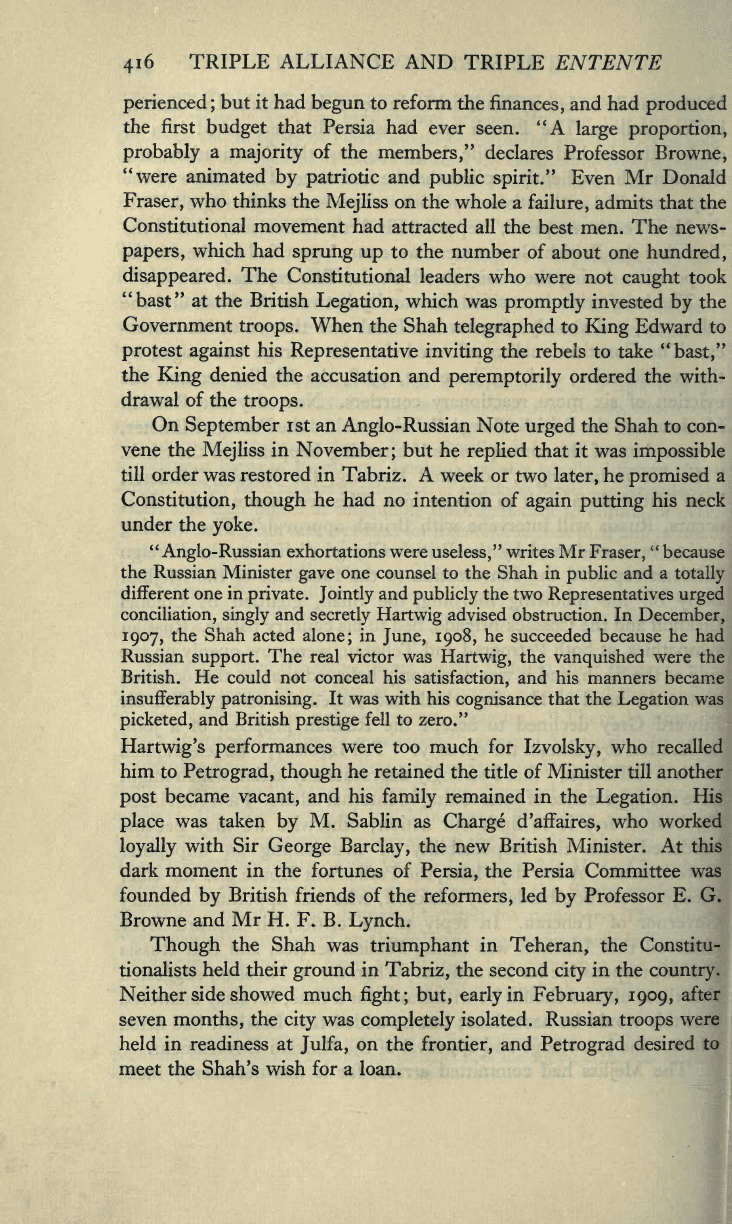
416
TRIPLE
ALLIANCE AND
TRIPLE
ENTENTE
perienced
;
but it
had
begun
to reform
the
finances,
and
had
produced
the
first
budget
that Persia had
ever
seen. "A
large
proportion,
probably
a
majority
of
the
members,"
declares
Professor
Browne,
"were
animated
by
patriotic
and
public
spirit."
Even
Mr Donald
Fraser,
who
thinks the
Mejliss
on
the
whole a
failure,
admits
that the
Constitutional
movement
had
attracted all
the
best
men. The news-
papers,
which
had
sprung up
to the
number of
about
one
hundred,
disappeared.
The
Constitutional
leaders who
were not
caught
took
"bast"
at
the
British
Legation,
which
was
promptly
invested
by
the
Government
troops.
When the Shah
telegraphed
to
King
Edward
to
protest
against
his
Representative
inviting
the
rebels
to
take
"bast,"
the
King
denied
the
accusation
and
peremptorily
ordered
the with-
drawal of
the
troops.
On
September
ist an
Anglo-Russian
Note
urged
the
Shah
to
con-
vene
the
Mejliss
in
November;
but
he
replied
that it
was
impossible
till order was
restored in
Tabriz.
A
week or
two
later,
he
promised
a
Constitution,
though
he
had
no
intention of
again putting
his neck
under
the
yoke.
"
Anglo-
Russian exhortations
were
useless,"
writes
Mr
Fraser,
"
because
the Russian Minister
gave
one counsel to
the
Shah in
public
and
a
totally
different
one
in
private.
Jointly
and
publicly
the two
Representatives urged
conciliation,
singly
and
secretly Hartwig
advised
obstruction.
In
December,
1907,
the Shah
acted
alone;
in
June,
1908,
he
succeeded because
he had
Russian
support.
The
real victor was
Hartwig,
the
vanquished
were
the
British. He
could
not conceal his
satisfaction,
and his manners became
insufferably
patronising.
It was with
his
cognisance
that the
Legation
was
picketed,
and
British
prestige
fell to
zero."
Hartwig's
performances
were
too
much for
Izvolsky,
who
recalled
him
to
Petrograd,
though
he
retained the
title
of
Minister
till another
post
became
vacant,
and his
family
remained
in
the
Legation.
His
place
was
taken
by
M.
Sablin as
Charge
d'affaires,
who worked
loyally
with
Sir
George
Barclay,
the new British Minister. At
this
dark
moment
in
the fortunes of
Persia,
the Persia Committee
was
founded
by
British friends of
the
reformers,
led
by
Professor
E.
G.
Browne
and
Mr
H.
F. B.
Lynch.
Though
the
Shah
was
triumphant
in
Teheran,
the
Constitu-
tionalists
held
their
ground
in
Tabriz,
the second
city
in
the
country.
Neither
side
showed
much
fight;
but,
early
in
February,
1909,
after
seven
months,
the
city
was
completely
isolated.
Russian
troops
were
held in readiness at
Julfa,
on
the
frontier,
and
Petrograd
desired
to
meet the
Shah's wish
for
a loan.
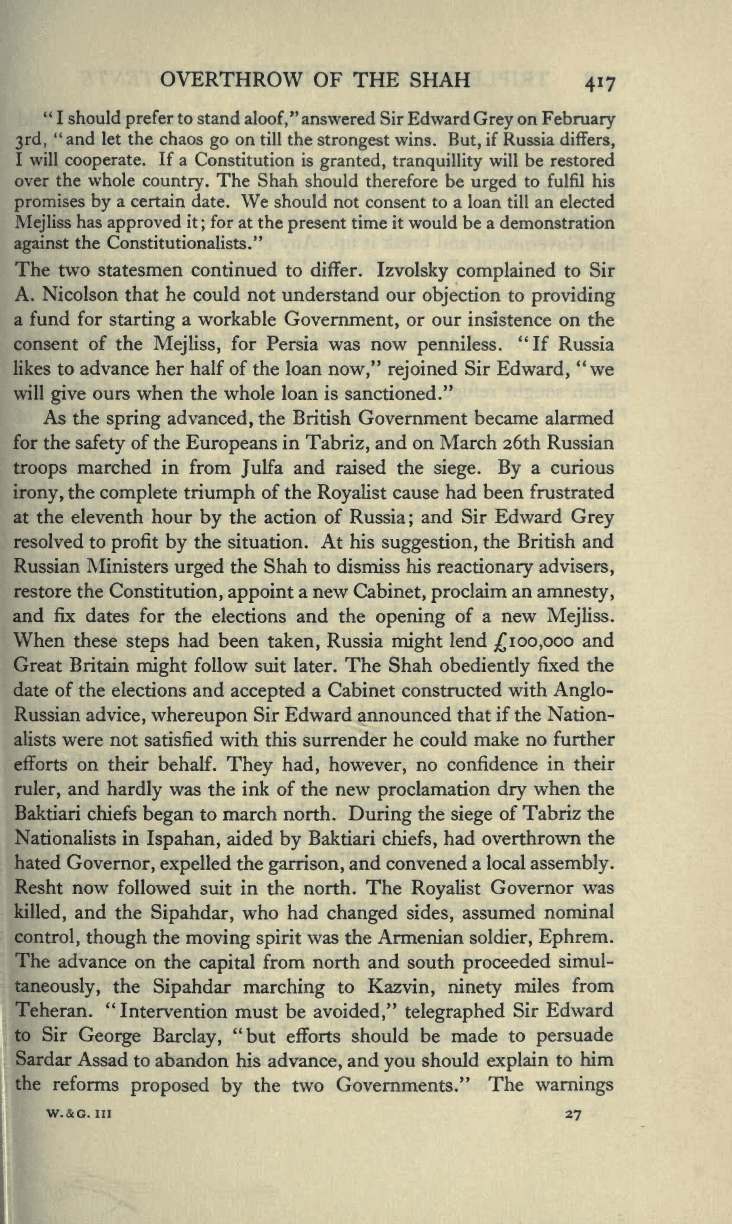
OVERTHROW
OF
THE SHAH
417
"
I should
prefer
to
stand
aloof,
"answered Sir Edward
Grey
on
February
3rd,
"and let the
chaos
go
on till
the
strongest
wins.
But,
if
Russia
differs,
I will
cooperate.
If
a
Constitution
is
granted,
tranquillity
will be restored
over the
whole
country.
The Shah
should therefore
be
urged
to fulfil
his
promises
by
a
certain
date. We should not
consent to a loan till an
elected
Mejliss
has
approved
it;
for
at
the
present
time it would
be
a
demonstration
against
the
Constitutionalists."
The
two statesmen continued
to
differ.
Izvolsky complained
to
Sir
A. Nicolson
that
he could
not understand our
objection
to
providing
a fund for
starting
a
workable
Government,
or
our
insistence
on
the
consent
of
the
Mejliss,
for
Persia was now
penniless.
"If
Russia
likes to
advance
her half of
the loan
now,"
rejoined
Sir
Edward,
"we
will
give
ours
when the whole loan is sanctioned."
As the
spring
advanced,
the
British
Government became alarmed
for
the
safety
of
the
Europeans
in
Tabriz,
and on March
26th
Russian
troops
marched in from
Julfa
and raised
the
siege. By
a curious
irony,
the
complete
triumph
of
the
Royalist
cause had been
frustrated
at the eleventh
hour
by
the
action
of
Russia;
and Sir
Edward
Grey
resolved
to
profit
by
the situation. At
his
suggestion,
the
British
and
Russian
Ministers
urged
the
Shah
to
dismiss his
reactionary
advisers,
restore
the
Constitution,
appoint
a new
Cabinet,
proclaim
an
amnesty,
and fix
dates for
the
elections
and the
opening
of a new
Mejliss.
When
these
steps
had been
taken,
Russia
might
lend
£100,000
and
Great Britain
might
follow
suit later.
The
Shah
obediently
fixed the
date of
the elections and
accepted
a Cabinet constructed
with
Anglo-
Russian
advice,
whereupon
Sir Edward announced that
if
the Nation-
alists were
not
satisfied with this
surrender he could
make
no
further
efforts on
their behalf.
They
had,
however,
no
confidence
in
their
ruler,
and
hardly
was
the
ink
of the new
proclamation
dry
when the
Baktiari chiefs
began
to
march
north.
During
the
siege
of Tabriz the
Nationalists
in
Ispahan,
aided
by
Baktiari
chiefs,
had overthrown
the
hated
Governor,
expelled
the
garrison,
and convened
a local
assembly.
Resht
now
followed
suit
in
the north. The
Royalist
Governor
was
killed,
and
the
Sipahdar,
who had
changed
sides,
assumed
nominal
control,
though
the
moving
spirit
was
the
Armenian
soldier,
Ephrem.
The
advance on
the
capital
from north
and
south
proceeded
simul-
taneously,
the
Sipahdar
marching
to
Kazvin,
ninety
miles
from
Teheran.
"
Intervention
must
be
avoided,"
telegraphed
Sir
Edward
to Sir
George
Barclay,
"but
efforts
should
be
made
to
persuade
Sardar
Assad
to abandon
his
advance,
and
you
should
explain
to
him
the
reforms
proposed
by
the two
Governments."
The
warnings
w.&g.
in
27
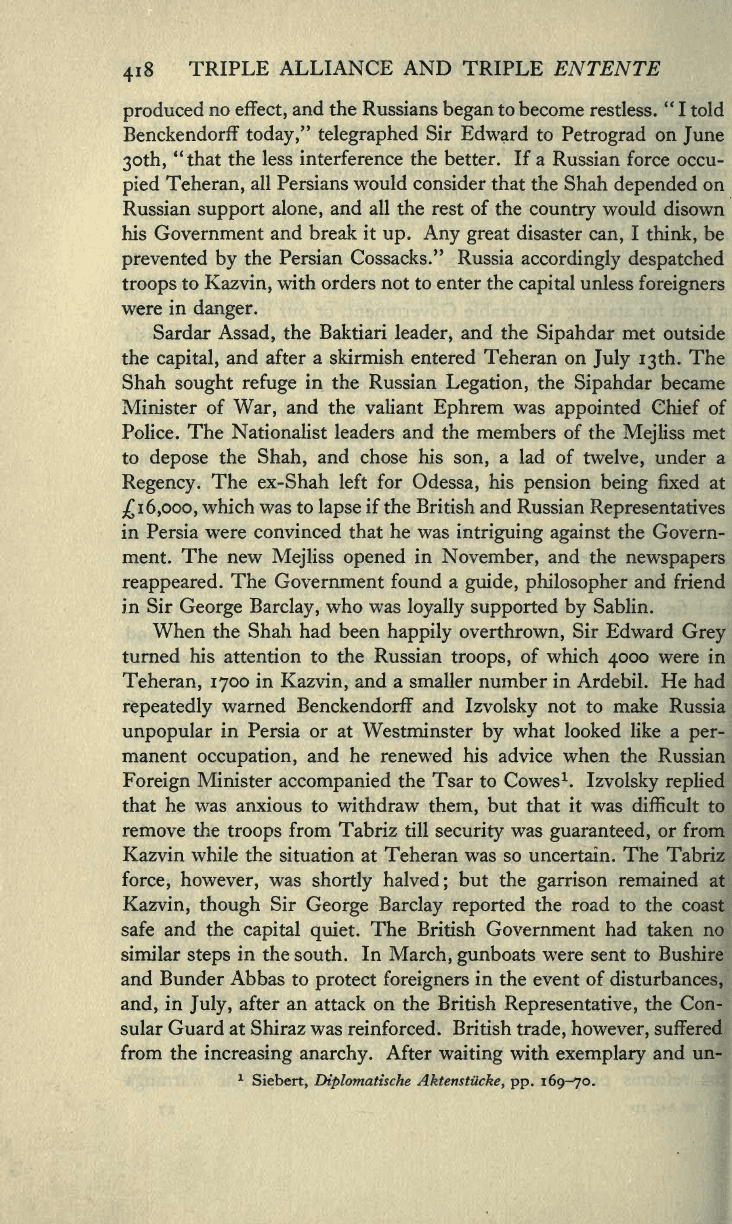
4i
8
TRIPLE
ALLIANCE AND
TRIPLE ENTENTE
produced
no
effect,
and
the
Russians
began
to
become restless.
"
I
told
Benckendorff
today,"
telegraphed
Sir
Edward
to
Petrograd
on
June
30th,
"that
the
less interference the
better.
If
a
Russian
force
occu-
pied
Teheran,
all
Persians
would
consider
that the
Shah
depended
on
Russian
support
alone,
and
all
the
rest
of
the
country
would disown
his Government
and break
it
up.
Any
great
disaster
can,
I
think,
be
prevented by
the
Persian
Cossacks." Russia
accordingly despatched
troops
to
Kazvin,
with
orders
not to
enter
the
capital
unless
foreigners
were
in
danger.
Sardar
Assad,
the
Baktiari
leader,
and the
Sipahdar
met outside
the
capital,
and after
a
skirmish entered Teheran on
July
13th.
The
Shah
sought refuge
in
the Russian
Legation,
the
Sipahdar
became
Minister
of
War,
and
the valiant
Ephrem
was
appointed
Chief of
Police.
The Nationalist leaders
and
the members of
the
Mejliss
met
to
depose
the
Shah,
and chose his
son,
a lad
of
twelve,
under a
Regency.
The ex-Shah left for
Odessa,
his
pension
being
fixed
at
£
16,000,
which
was to
lapse
if
the British
and
Russian
Representatives
in Persia were
convinced
that he was
intriguing against
the
Govern-
ment.
The new
Mejliss
opened
in
November,
and
the
newspapers
reappeared.
The
Government
found a
guide, philosopher
and
friend
in
Sir
George Barclay,
who was
loyally
supported
by
Sablin.
When the
Shah had been
happily
overthrown,
Sir
Edward
Grey
turned
his
attention
to
the
Russian
troops,
of which
4000
were
in
Teheran,
1700
in
Kazvin,
and
a smaller number
in
Ardebil.
He had
repeatedly
warned Benckendorff and
Izvolsky
not to make
Russia
unpopular
in
Persia
or
at Westminster
by
what looked like a
per-
manent
occupation,
and
he renewed his advice when
the
Russian
Foreign
Minister
accompanied
the
Tsar
to
Cowes
1
.
Izvolsky replied
that he
was
anxious to withdraw
them,
but
that it was
difficult to
remove the
troops
from Tabriz till
security
was
guaranteed,
or
from
Kazvin while
the
situation at Teheran
was
so
uncertain.
The Tabriz
force, however,
was
shortly
halved;
but the
garrison
remained
at
Kazvin,
though
Sir
George
Barclay
reported
the
road
to the
coast
safe
and
the
capital
quiet.
The
British
Government
had
taken
no
similar
steps
in
the
south.
In
March,
gunboats
were sent to Bushire
and Bunder Abbas
to
protect
foreigners
in
the event of
disturbances,
and,
in
July,
after
an
attack
on
the
British
Representative,
the
Con-
sular Guard at Shiraz was
reinforced.
British
trade,
however,
suffered
from
the
increasing
anarchy.
After
waiting
with
exemplary
and un-
1
Siebert,
Diplomatische Aktenstucke,
pp.
169-70.

MR
SHUSTER ARRIVES
419
rewarded
patience
for
the
restored
Government to
assert
itself,
Sir
Edward
sent
an
ultimatum to Teheran
on
October
14th, 19
10,
on
the
state
of
the southern
roads.
Unless
within three months
order was
restored
on
the road
from
Bushire
to
Ispahan,
Great
Britain
would
police
it.
The
threat, however,
was
never
carried
out,
and we
loyally
supported
the Swedish
gendarmerie,
to
whom
the task
of
restoring
order was
committed
by
the Persian
Government.
The root
of Persia's
maladies
lay
in
finance
;
and
on December
25th,
1910,
President
Taft
was asked
to select
a
Treasurer-General,
with
four
assistants,
for
three
years.
Neither the
British
nor
the
Russian Government raised
any objection,
though
the latter
dis-
approved
the
step,
and
on
May
12th,
191
1,
Mr
Shuster entered
Teheran
1
.
The
Regent,
Nasr-ul-Mulk,
an Oxford
graduate,
now
returned
from
Europe,
and
the
Russian
troops
were
at
length
with-
drawn from
Kazvin.
It seemed as if
at
last
a
brighter day
was
to
dawn.
Mr
Shuster
perceived
from
the
outset that
he must take
a
firm line
against
native
and
foreign
enemies of
reform, and,
on
June
13th,
he obtained
full
powers
over finance from
the
Mejliss.
"
Shuster
has
apparently
created a
great
impression
on
the
Persians,"
reported
Sir
George Barclay,
"and
the
unanimity
with
which all
parties
have
given
him
the
full
powers
for which he
has
asked
proves
that
they
repose
the
utmost
confidence
in
him. He has
let
it
be
widely
known
that
if he finds
obstacles
placed
in
his
way
by any
person
or
persons,
he will
denounce them to the
Mejliss,
and if he cannot remove
their
obstruction
he will
return.
"
Mr
Shuster
had,
on his
voyage
across the
Altantic,
read
the
Blue-
books and
the
writings
of
Professor
Browne,
and he knew
that
he
would
have to meet the
hostility
of
Russia. The
first
round
of
the
match
was
not
long delayed.
For
collecting
the
revenue
a
Treasury
Gendarmerie
was
required
;
and in
Major
Stokes,
now near the
end
of
his four
years'
service as
Military
Attache,
he found
the
man whom
he needed. Sir
George
Barclay,
on
being
consulted,
replied
that
the
Major
would have
to
resign
his commission in
the
Indian
army.
Sir
Edward
Grey
referred
the
matter to
Petrograd
before
replying,
and
Sir
George
Buchanan
reported
the
result.
The
Acting-Minister (Neratoff)
did
not
object
to the
gendarmerie;
but
it
must be under
one
officer,
preferably
the
subject
of a smaller
Power
I
pointed
out
that it
might
be
very
difficult
to
secure the
right
man,
and
that
Stokes
seemed
eminently qualified;
to which Neratoff
rejoined,
"A
Swede would
do."
1
Mr
Shuster
has told his own
story
in
The
Strangling
of
Persia
(191 2).
27
—
2
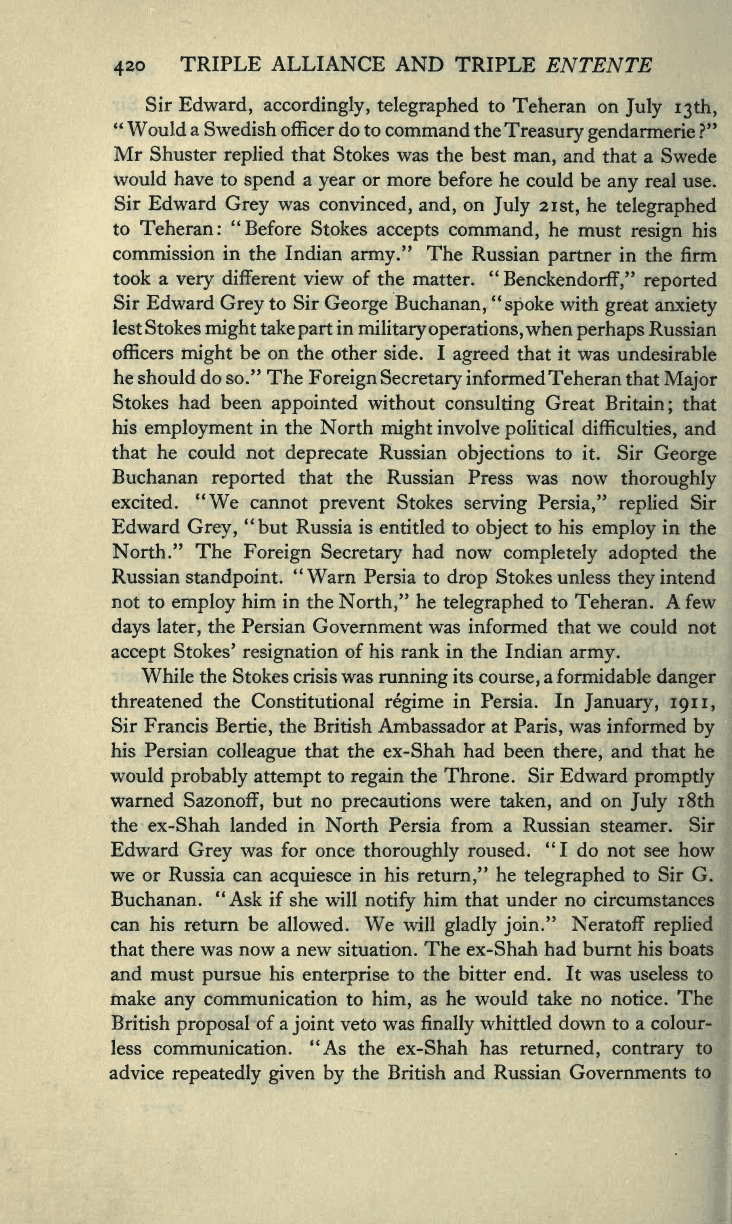
420
TRIPLE ALLIANCE AND
TRIPLE
ENTENTE
Sir
Edward,
accordingly,
telegraphed
to
Teheran on
July
13th,
"
Would
a
Swedish
officer do
to
command the
Treasury
gendarmerie
?"
Mr Shuster
replied
that
Stokes was
the
best
man,
and
that
a
Swede
would have
to
spend
a
year
or
more
before
he
could
be
any
real
use.
Sir Edward
Grey
was
convinced,
and,
on
July
21st,
he
telegraphed
to
Teheran:
"Before
Stokes
accepts
command,
he
must
resign
his
commission
in
the
Indian
army."
The
Russian
partner
in
the
firm
took a
very
different view
of
the matter.
"
Benckendorff
,"
reported
Sir
Edward
Grey
to
Sir
George
Buchanan,
"spoke
with
great
anxiety
lest Stokes
might
take
part
in
military
operations,
when
perhaps
Russian
officers
might
be on
the other
side.
I
agreed
that it was
undesirable
he should
do
so."
The
Foreign
Secretary
informed
Teheran
that
Major
Stokes
had
been
appointed
without
consulting
Great
Britain;
that
his
employment
in
the
North
might
involve
political
difficulties,
and
that he
could
not
deprecate
Russian
objections
to
it.
Sir
George
Buchanan
reported
that
the Russian Press was
now
thoroughly
excited. "We cannot
prevent
Stokes
serving
Persia,"
replied
Sir
Edward
Grey,
"but Russia is entitled
to
object
to his
employ
in
the
North."
The
Foreign Secretary
had
now
completely adopted
the
Russian
standpoint.
"Warn Persia
to
drop
Stokes unless
they
intend
not to
employ
him in
the
North,"
he
telegraphed
to
Teheran.
A
few
days
later,
the Persian
Government was informed
that
we
could
not
accept
Stokes'
resignation
of
his rank
in
the
Indian
army.
While the
Stokes
crisis was
running
its
course,
a formidable
danger
threatened the Constitutional
regime
in
Persia.
In
January, 191
1,
Sir
Francis
Bertie,
the British
Ambassador
at
Paris,
was
informed
by
his
Persian
colleague
that the
ex-Shah had
been
there,
and that he
would
probably
attempt
to
regain
the Throne.
Sir
Edward
promptly
warned
SazonofT,
but
no
precautions
were
taken,
and on
July
18th
the
ex-Shah
landed in
North
Persia from a Russian
steamer.
Sir
Edward
Grey
was for once
thoroughly
roused.
"I do
not see how
we
or
Russia can
acquiesce
in his
return,"
he
telegraphed
to
Sir G.
Buchanan.
"Ask if
she
will
notify
him
that
under
no
circumstances
can
his
return be
allowed. We will
gladly join."
Neratoff
replied
that there
was
now a
new situation.
The ex-
Shah
had burnt
his boats
and
must
pursue
his
enterprise
to the bitter
end.
It
was useless
to
make
any
communication
to
him,
as he would take
no
notice.
The
British
proposal
of a
joint
veto
was
finally
whittled
down
to
a colour-
less
communication. "As
the
ex-Shah
has
returned,
contrary
to
advice
repeatedly
given by
the
British
and Russian Governments
to
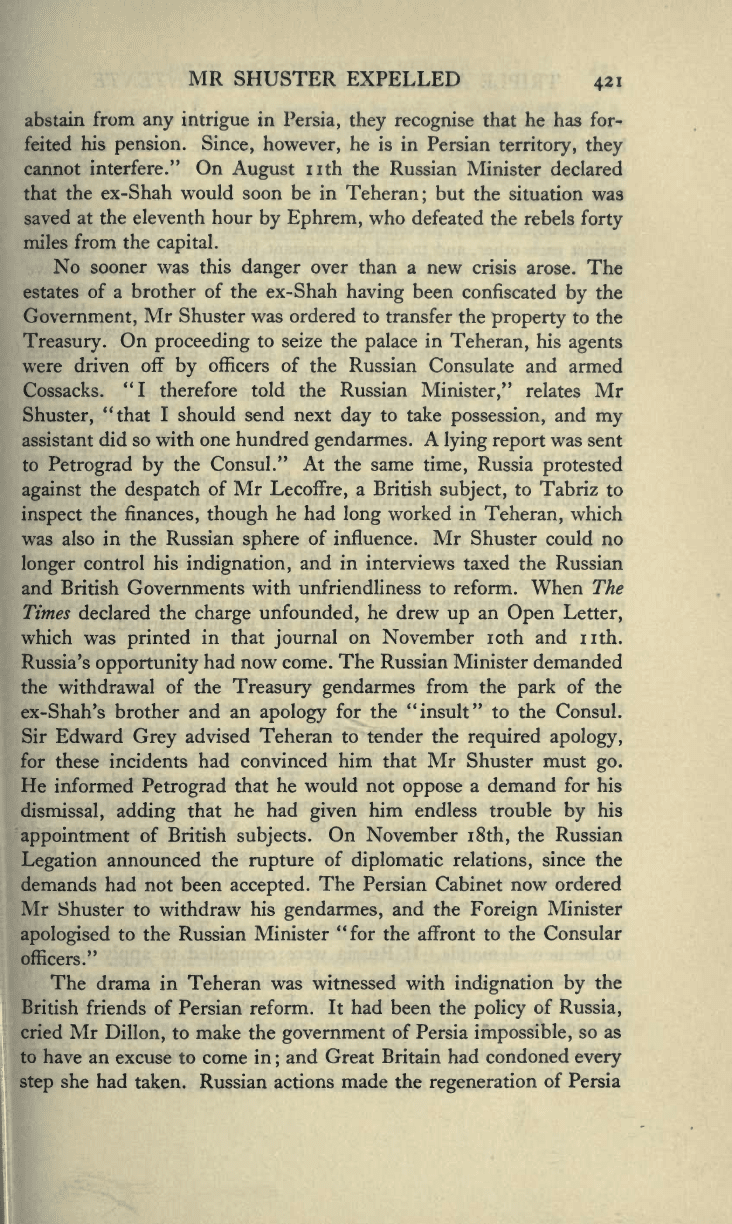
MR
SHUSTER
EXPELLED
421
abstain
from
any
intrigue
in
Persia,
they
recognise
that
he has for-
feited
his
pension.
Since,
however,
he
is in
Persian
territory, they
cannot
interfere."
On
August
nth
the Russian
Minister declared
that
the
ex-Shah would soon
be in
Teheran;
but
the situation was
saved
at
the eleventh
hour
by Ephrem,
who
defeated
the
rebels
forty
miles
from
the
capital.
No sooner was
this
danger
over
than
a new
crisis
arose. The
estates
of a brother of
the
ex-Shah
having
been
confiscated
by
the
Government,
Mr
Shuster
was ordered
to
transfer the
property
to the
Treasury.
On
proceeding
to seize
the
palace
in
Teheran,
his
agents
were driven
off
by
officers
of
the
Russian
Consulate and
armed
Cossacks.
"I
therefore
told the Russian
Minister,"
relates Mr
Shuster,
"that
I
should send
next
day
to
take
possession,
and
my
assistant
did so
with
one hundred
gendarmes.
A
lying report
was
sent
to
Petrograd by
the
Consul." At the same
time,
Russia
protested
against
the
despatch
of
Mr
LecofTre,
a
British
subject,
to Tabriz
to
inspect
the
finances,
though
he
had
long
worked in
Teheran,
which
was also
in
the
Russian
sphere
of
influence.
Mr
Shuster
could no
longer
control
his
indignation,
and in
interviews taxed the
Russian
and
British
Governments with unfriendliness to reform. When
The
Times
declared the
charge
unfounded,
he
drew
up
an
Open
Letter,
which
was
printed
in
that
journal
on November
10th
and
nth.
Russia's
opportunity
had now come. The Russian
Minister
demanded
the withdrawal
of the
Treasury
gendarmes
from
the
park
of
the
ex-Shah's brother
and an
apology
for the "insult" to the Consul.
Sir
Edward
Grey
advised Teheran
to tender the
required
apology,
for
these
incidents
had convinced
him
that
Mr
Shuster must
go.
He informed
Petrograd
that
he
would
not
oppose
a
demand
for
his
dismissal,
adding
that
he
had
given
him
endless trouble
by
his
appointment
of
British
subjects.
On November
18th,
the
Russian
Legation
announced
the
rupture
of
diplomatic
relations,
since the
demands
had
not
been
accepted.
The
Persian Cabinet
now ordered
Mr
Shuster to withdraw
his
gendarmes,
and
the
Foreign
Minister
apologised
to the Russian
Minister
"for
the
affront to the
Consular
officers."
The drama
in
Teheran
was witnessed with
indignation
by
the
British
friends of
Persian
reform.
It
had
been
the
policy
of
Russia,
cried Mr
Dillon,
to make the
government
of
Persia
impossible,
so
as
to
have an
excuse
to
come in
;
and
Great
Britain had
condoned
every
step
she had
taken. Russian actions
made
the
regeneration
of Persia
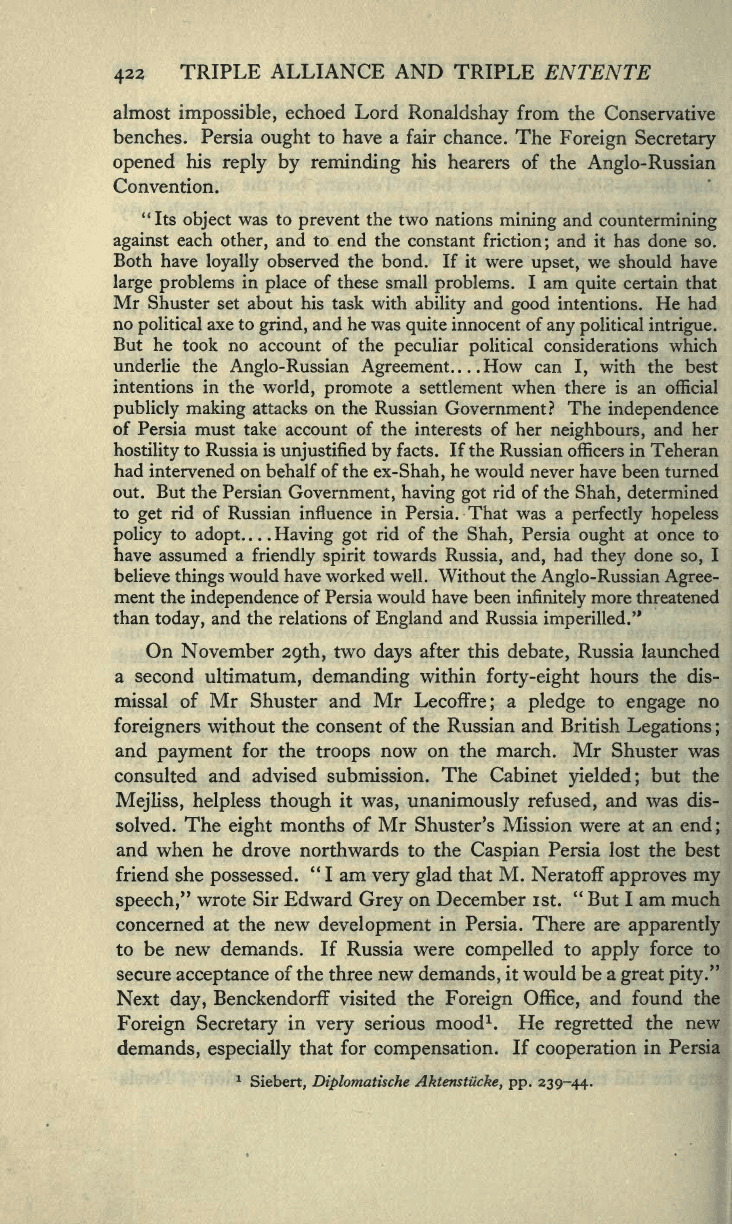
422
TRIPLE
ALLIANCE AND
TRIPLE
ENTENTE
almost
impossible,
echoed Lord
Ronaldshay
from
the Conservative
benches.
Persia
ought
to have a fair
chance.
The
Foreign Secretary
opened
his
reply by
reminding
his
hearers of
the
Anglo-
Russian
Convention.
"
Its
object
was to
prevent
the two
nations
mining
and
countermining
against
each
other,
and
to end
the constant
friction;
and
it has done so.
Both
have
loyally
observed
the
bond.
If
it
were
upset,
we should have
large problems
in
place
of
these small
problems.
I am
quite
certain that
Mr
Sinister
set about his task with
ability
and
good
intentions.
He
had
no
political
axe to
grind,
and he was
quite
innocent
of
any political
intrigue.
But he took no
account
of
the
peculiar political
considerations which
underlie
the
Anglo-Russian Agreement..
. .How can
I,
with
the
best
intentions in
the
world,
promote
a
settlement
when
there is
an official
publicly
making
attacks
on
the Russian
Government? The
independence
of
Persia
must take account of the interests of
her
neighbours,
and her
hostility
to
Russia is
unjustified
by
facts.
If the
Russian officers
in
Teheran
had
intervened
on
behalf
of
the
ex-Shah,
he would
never have been
turned
out.
But
the Persian
Government,
having
got
rid
of the
Shah,
determined
to
get
rid of
Russian influence
in
Persia. That
was
a
perfectly hopeless
policy
to
adopt
Having got
rid of
the
Shah,
Persia
ought
at once to
have
assumed
a
friendly spirit
towards
Russia, and,
had
they
done
so,
I
believe
things
would have worked well. Without
the
Anglo-
Russian
Agree-
ment the
independence
of Persia would have been
infinitely
more threatened
than
today,
and
the
relations
of
England
and
Russia
imperilled."
On November
29th,
two
days
after this
debate,
Russia launched
a
second
ultimatum,
demanding
within
forty-eight
hours
the
dis-
missal of
Mr
Shuster and
Mr
Lecoffre;
a
pledge
to
engage
no
foreigners
without the consent
of
the
Russian and
British
Legations
;
and
payment
for
the
troops
now on
the march.
Mr
Shuster was
consulted
and advised submission. The
Cabinet
yielded;
but
the
Mejliss,
helpless
though
it
was,
unanimously
refused,
and was dis-
solved. The
eight
months
of
Mr
Shuster's
Mission
were at
an
end;
and
when
he drove
northwards
to
the
Caspian
Persia
lost the
best
friend she
possessed.
"
I
am
very glad
that
M. Neratoff
approves my
speech,"
wrote
Sir
Edward
Grey
on December
1st.
"
But
I
am
much
concerned at the new
development
in Persia. There
are
apparently
to be new demands.
If
Russia
were
compelled
to
apply
force
to
secure
acceptance
of
the three new
demands,
it would be a
great
pity."
Next
day,
BenckendorfT visited the
Foreign
Office,
and
found the
Foreign
Secretary
in
very
serious
mood
1
.
He
regretted
the
new
demands,
especially
that
for
compensation.
If
cooperation
in Persia
1
Siebert,
Diplomatische
Aktenstiicke,
pp. 239-44.
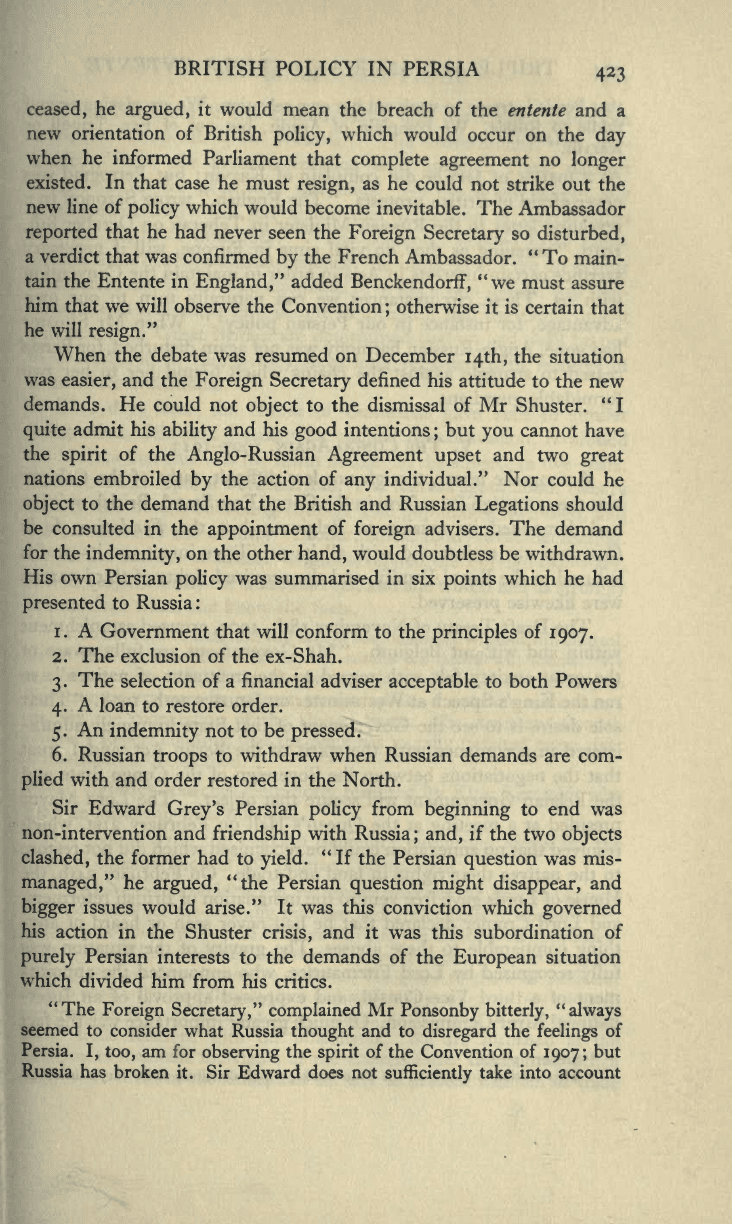
BRITISH
POLICY IN
PERSIA
423
ceased,
he
argued,
it
would
mean the breach of
the
entente and
a
new orientation of
British
policy,
which
would
occur on
the
day
when he
informed
Parliament
that
complete
agreement
no
longer
existed.
In
that case
he
must
resign,
as he
could
not
strike
out the
new line
of
policy
which
would become
inevitable.
The
Ambassador
reported
that
he
had
never
seen the
Foreign
Secretary
so
disturbed,
a
verdict that was
confirmed
by
the
French
Ambassador.
"
To main-
tain the
Entente
in
England,"
added
Benckendorff,
"we
must
assure
him
that we will
observe
the Convention
;
otherwise
it
is
certain
that
he will
resign."
When
the debate was
resumed
on
December
14th,
the
situation
was
easier,
and
the
Foreign
Secretary
defined
his
attitude to the
new
demands. He could
not
object
to the
dismissal
of Mr
Shuster.
"
I
quite
admit
his
ability
and
his
good
intentions
;
but
you
cannot have
the
spirit
of
the
Anglo-
Russian
Agreement upset
and
two
great
nations
embroiled
by
the action
of
any
individual." Nor
could
he
object
to the demand
that the British
and
Russian
Legations
should
be
consulted in
the
appointment
of
foreign
advisers.
The demand
for
the
indemnity,
on
the other
hand,
would
doubtless be
withdrawn.
His
own
Persian
policy
was summarised
in
six
points
which
he
had
presented
to Russia:
1. A
Government that
will
conform to the
principles
of
1907.
2.
The
exclusion of
the ex-Shah.
3.
The
selection of a financial
adviser
acceptable
to both Powers
4.
A
loan
to
restore
order.
5.
An
indemnity
not to
be
pressed.
6.
Russian
troops
to
withdraw when Russian
demands are com-
plied
with and
order
restored
in
the North.
Sir
Edward
Grey's
Persian
policy
from
beginning
to end was
non-intervention
and
friendship
with
Russia;
and,
if
the
two
objects
clashed,
the
former
had
to
yield.
"If
the Persian
question
was
mis-
managed,"
he
argued,
"the
Persian
question
might disappear,
and
bigger
issues
would
arise."
It
was
this
conviction
which
governed
his
action in
the
Shuster
crisis,
and
it was
this subordination
of
purely
Persian
interests to
the
demands
of
the
European
situation
which
divided him
from his critics.
"The
Foreign Secretary," complained
Mr
Ponsonby
bitterly, "always
seemed to
consider what
Russia
thought
and
to
disregard
the
feelings
of
Persia.
I,
too,
am
for
observing
the
spirit
of the
Convention
of
1907;
but
Russia
has
broken
it. Sir Edward
does not
sufficiently
take
into
account
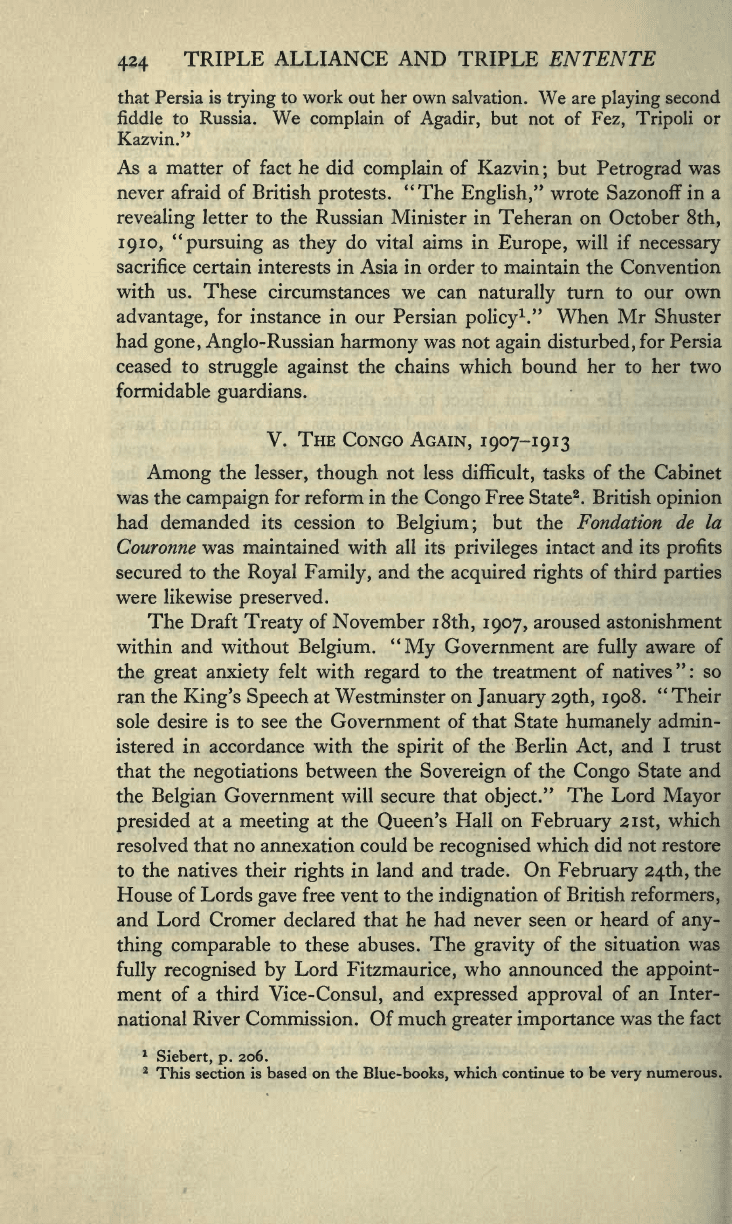
424
TRIPLE ALLIANCE
AND TRIPLE ENTENTE
that
Persia
is
trying
to work out
her own
salvation.
We
are
playing
second
riddle
to
Russia.
We
complain
of
Agadir,
but not of
Fez,
Tripoli
or
Kazvin."
As
a
matter
of
fact
he did
complain
of Kazvin
;
but
Petrograd
was
never afraid
of
British
protests.
"The
English,
"
wrote
SazonofF
in a
revealing
letter to the Russian
Minister
in
Teheran on October
8th,
1
9
10,
"pursuing
as
they
do
vital aims
in
Europe,
will if
necessary
sacrifice
certain
interests
in
Asia in
order
to
maintain
the
Convention
with
us.
These
circumstances we can
naturally
turn to
our
own
advantage,
for
instance
in
our Persian
policy
V When Mr
Shuster
had
gone, Anglo-Russian
harmony
was
not
again
disturbed,
for Persia
ceased
to
struggle against
the chains which
bound
her to her two
formidable
guardians.
V.
The
Congo
Again,
1907-19
13
Among
the
lesser,
though
not less
difficult,
tasks
of
the Cabinet
was
the
campaign
for
reform
in
the
Congo
Free State
2
. British
opinion
had demanded its cession to
Belgium;
but the
Fondation de la
Couronne
was
maintained with all its
privileges
intact
and
its
profits
secured to
the
Royal
Family,
and the
acquired rights
of
third
parties
were likewise
preserved.
The Draft
Treaty
of
November
18th,
1907,
aroused astonishment
within
and
without
Belgium. "My
Government are
fully
aware
of
the
great
anxiety
felt with
regard
to the treatment
of
natives
": so
ran
the
King's
Speech
at Westminster
on
January 29th, 1908.
"
Their
sole desire
is
to
see
the Government
of
that State
humanely
admin-
istered
in accordance with
the
spirit
of
the Berlin
Act,
and
I
trust
that the
negotiations
between the
Sovereign
of
the
Congo
State and
the
Belgian
Government
will
secure that
object.'
'
The
Lord
Mayor
presided
at a
meeting
at the
Queen's
Hall
on
February
21st,
which
resolved that
no
annexation could
be
recognised
which did not
restore
to the
natives their
rights
in
land and trade.
On
February
24th,
the
House
of
Lords
gave
free
vent to the
indignation
of
British
reformers,
and Lord Cromer
declared that he
had never seen
or heard
of
any-
thing
comparable
to these abuses.
The
gravity
of
the situation
was
fully recognised
by
Lord
Fitzmaurice,
who
announced
the
appoint-
ment
of
a third
Vice-
Consul,
and
expressed
approval
of
an
Inter-
national
River Commission. Of much
greater
importance
was the
fact
1
Siebert,
p.
206.
2
This section
is based on the
Blue-books,
which
continue
to
be
very
numerous.
